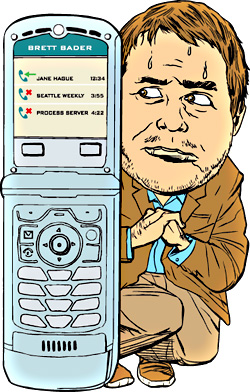People want to talk to Brett Bader. But the usually chatty political operative from Madison Communications appears to be incommunicado—if you’re a reporter, attorney, or process server, anyway.
Bader was the quotable spokesperson for statewide Initiative 912, a failed Republican effort to cut $5.5 billion worth of Democrat-backed state gas taxes in 2005. He’s also the reigning campaign consultant for Eastside Republicans; his client list has included Attorney General Rob McKenna, former U.S. Rep. Jennifer Dunn, gubernatorial candidate/talk-show host John Carlson, and King County Council member Jane Hague. But Bader’s had no response these past two weeks to reports of his Bothell-based firm’s possible involvement in the widening Alaska political scandals, which imply that Madison was part of a legislator’s illegal campaign-funding effort.
Bader’s attorney, Mark Lamb, says his client was out of town last week. But Bader can be “very hard to pin down,” according to the report of a persistent process server who recently tried, unsuccessfully, for two months to place a court summons in Bader’s hand. It was notice of a breach-of-contract lawsuit alleging Bader’s failure to repay most of a $44,500 loan from a business associate. As a result, he currently faces a default judgment (meaning he failed to appear or respond to the suit) in King County Superior Court.
His firm is already in default for failing to appear in a second King County case, this one involving a defamation claim against Bader, the firm, and councilmember Hague. (Last fall, Bader helped Hague swerve and stagger around a series of financial and campaign mishaps, including a DUI arrest, to win reelection.) Paul Brecht, a key backer of Hague’s 2007 opponent, Richard Pope, claims he was defamed and libeled by one of Hague’s Bader-made campaign posters. According to his lawsuit, Brecht denies he was ever convicted of assault or that he “tops law enforcement lists” as a wife-beater, as a Hague-Bader poster stated in an attempt to slime Pope by the company he keeps. Brecht happens to be represented in court by Pope, a Bellevue attorney and perennial political candidate/gadfly, who says he expects the judge who ordered the Aug. 7 default to finalize it soon and leave Bader’s firm liable for damages.
Bader’s attorney, Lamb, considers the default a technicality. Bader himself has filed notice of appearance in that case, as has Hague. But Bader’s firm and business partner, Jeff Davis, have not. Lamb says he plans to rectify that “and undo the default.” He also smells victory.
“You look at case law involving public figures and limited public figures, and this being something said in a political campaign—I’m not sure how compelling a claim it is,” he notes.
But Lamb was surprised to hear that his client and office mate (he and Bader share space) faced default in the other case involving the unpaid loan. The process server in that case, Kevin Van Dyke of ABC Legal Services, says in court papers that during his failed attempts to serve Bader, he talked with “an attorney who shares space with Mr. Bader,” and was told, “Mr. Bader comes and goes and doesn’t have any other employees; he is very hard to pin down.” Lamb last week said he didn’t recall talking with Van Dyke.
After the April lawsuit was filed by a Bader associate named Seth Milasich, who alleges Bader owes him $37,700 on a $44,500 loan made in 2006, Van Dyke says he attempted 15 deliveries of the summons. He sporadically dropped by, night and day, from April 29 through June 9, to Bader’s Bothell office and Woodinville home, but never saw nor got a response from Bader when he knocked. On several occasions, Van Dyke says, he heard a female voice in Bader’s home tell the dogs to stop barking, but no one answered. In late June, Milasich’s attorney published the summons in a newspaper legal ad, giving Bader 60 days to respond or face default. The deadline is this week.
“I’ll definitely ask him about it when he gets back in town,” says Lamb.
Lamb also claims he hasn’t asked Bader about another nagging issue: the possible involvement of Madison Communications in the ever-widening Alaskan political corruption scandal, which now reaches from U.S. Sen. Ted Stevens—accused of accepting illegal favors from oilmen—to a host of businessmen and state legislators, including Stevens’ son Ben, who’s suspected of conspiracy and bribery.
“I haven’t spoken with [Bader] about that story,” says Lamb, “although I know he hasn’t broken the law or done anything wrong.” Lamb says he was only aware of Madison’s Alaska connection after reading about it on newspaper blogs. “The suspicion is that the story may have been a little bit off. I don’t know more than that: that the story may have overstated what happened.”
On Aug. 11, Anchorage private-prison developer Bill Weimar pled guilty to conspiring to secretly funnel bribe money to a political consultant for an unnamed state Senate candidate. All that assistant U.S. Attorney Joe Bottini would say about the consultant was that he was from Seattle. But the Anchorage Daily News, which identified the unnamed candidate as former legislator Jerry Ward, a Republican who “fervently pushed private-prison projects as a legislator,” implied the consultant was Bader and his firm, singling them out as earning $43,000 for aiding Ward’s 2004 campaign.
The ADN was unable to reach Bader, nor could The Seattle Times. Similarly, SW has made numerous requests, all without responses, for comment from Bader. Lamb says he’ll check with Bader once his client’s back in town.








